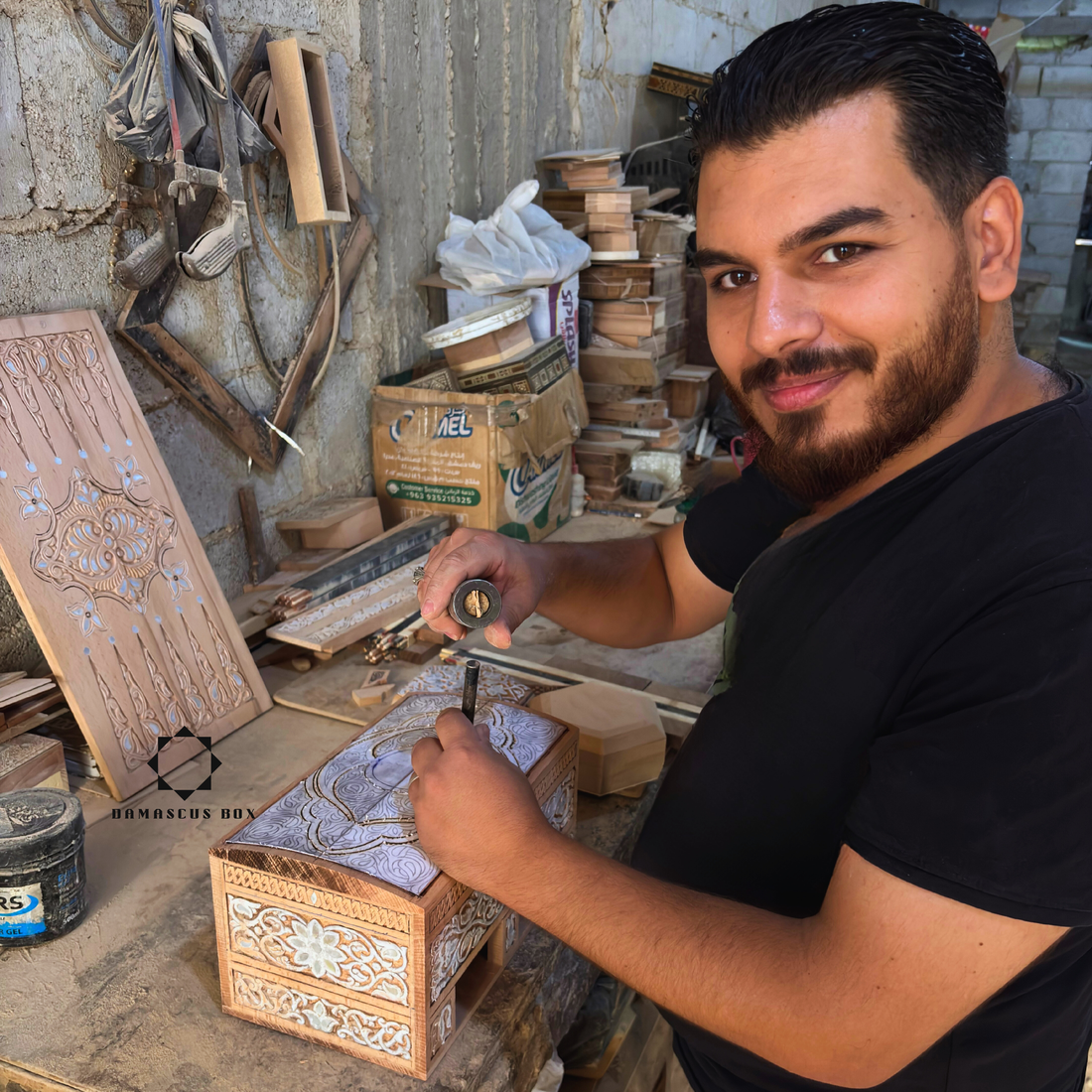
Mohammad Tarek Aldahh – Known as Abu Kamal: A New Generation Keeping the Legacy of Damascus Alive
Share
Told by Yazan Krayem – Founder of Damascus Box
In the heart of Damascus, amid the hum of the city and the rhythm of daily life, a new generation quietly works to keep an ancient craft alive. Among them stands Mohammad Tarek Aldahh, known as Abu Kamal, a young artisan whose hands move with the precision and soul of a master beyond his years.
Born in 1991 in Al Shaghour, one of Damascus’s oldest and most storied neighborhoods, Abu Kamal grew up between the scent of wood and the shimmer of mother-of-pearl. Today, in a modest workshop hidden behind the bustling markets of the Old City, he continues the tale of Damascene mosaic craftsmanship — not as a fading memory, but as a living expression of identity, patience, and beauty.
“I started when I was very young. I felt that this craft was part of me. Every piece we make tells the story of Damascus — it carries a part of our spirit and shares our beauty with the world.”
The Art of Geometry and Beauty
Abu Kamal describes his process as a form of harmony — a musical rhythm that begins with geometric stars carefully arranged, joined piece by piece, glued to wood, then sanded, lined, and refined entirely by hand.
Every stage demands patience and precision, and each finished piece carries the quiet pride of its maker.
He lifts a small box toward the light and smiles:
“Everything is natural — the wood, the colors, the shell. We build it piece by piece with our hands until it becomes a true Damascene creation.”
From lemonwood and eucalyptus to olive, beech, and walnut, every type of wood is drawn from Syria’s natural wealth. Even the finishing — a deep red velvet lining and the traditional bardakha polishing technique — adds a warmth and authenticity that no modern machine can ever replicate.
Between Tradition and Renewal
Though still young, Abu Kamal speaks with the calm confidence of a master craftsman. For him, this work is not only an art — it is identity, responsibility, and devotion.
“This craft is threatened, but as long as people love their heritage, it won’t disappear. It may change, but its spirit will stay.”
He was trained by Elias Shamoun, one of Damascus’s respected mosaic masters, and sees himself as a link in a long and unbroken chain of artisans who carried this craft forward through generations.
Damascene Geometry – A Signature Beyond Imitation
In Abu Kamal’s designs, geometry becomes a philosophy of beauty. Every pattern — hexagonal, circular, or oval — follows the timeless harmony of Damascene art, handed down through centuries yet reimagined through his personal style.
“Anyone who sees a true piece of mosaic knows instantly that it’s from Damascus. It can’t be imitated — it carries the soul of the city.”
Each star, each fine wooden line, tells the story of a city that never grows old — and of a craftsman who pours his soul into every detail.
A Generation Carrying the Flame
For Abu Kamal, craftsmanship is not merely about preserving the past — it is about shaping the future. He teaches his brothers and friends the secrets of the trade and dreams of passing it down one day to his children.
“The more time and effort you give it, the more pride it gives back. This craft takes patience, but it gives something of your soul in return.”
A Living Legacy
Mohammad Tarek Aldahh (Abu Kamal) represents a new generation of Damascene artisans — young, passionate, deeply rooted in tradition, yet filled with creative energy to keep this art alive.
Written by Yazan Krayem
At Damascus Box, we proudly support young Syrian craftsmen and the heritage of Damascene artistry — working to keep this ancient craft alive, piece by piece, for generations to come.
